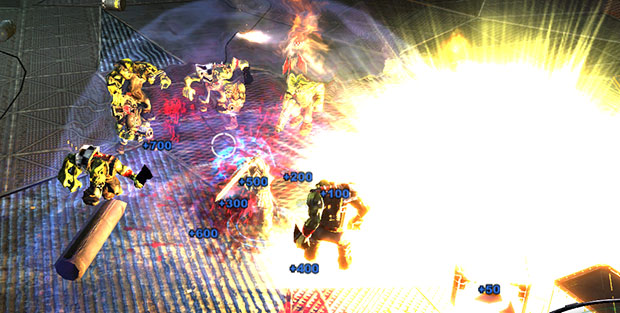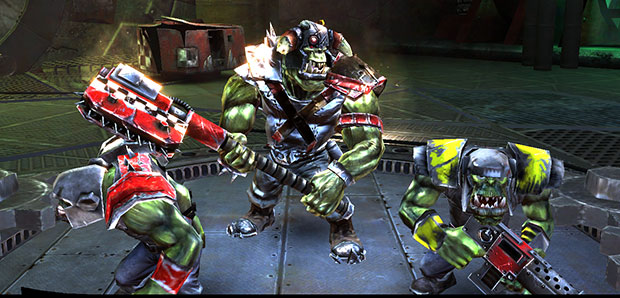Impressions: Warhammer 40,000 Kill Team
I wandered lonely as a Space Marine
I've spent a few hours with Kill Team, the in-theory co-op 40K arcade shooter released on 360 and PS3 in 2011, and which unexpectedly turned up on Steam last week.
There's no 'I' in team, and there's no 'online co-op mode' in Kill Team. Which is pretty crazy, as this was a game designed for online co-op. Seemingly rushed out on PC, the favourably received downloadable console game finds itself with barebones options and only shared-screen multiplayer. This is a damned shame, as Kill Team is/could have been such a good time.

It's a cross between a twinstick shooter and a baby Diabolike, set in Games Workshop's ultro-grimdark sci-fi setting. There's not a lot to it: to some degree it's the distillation of the Space Marine fantasy, which means burning the heretic by the dozen. You play as a little man with a little gun and a little sword (upgraded as you play), which you attack lots of little Orks and the like with. They die in huge numbers, you die only occasionally, and it feels pretty good.
It also feels pretty lonely. Perhaps I wouldn't be saying that if I didn't already know that this was designed as co-op game, but there is a certain emptiness to Kill Team as a solo affair. Environments are empty and repetitive, and I know that chuckling as a mate downed 12 Orks simultaneously or you rescued him from certain doom with a well-timed grenade would pep things up enormously. You can do that in the PC version, but only by having a chum come join you at your PC and plugging in an extra gamepad.
A short clip of me playing the first level.
There's also the way the camera forbids and often seizes control, placing the game's eye in such a way that's ideal for keeping multiple players in view at all times but infuriating for a single Marine trying to trudge through dark corridors without getting the iron skull on his crotch caught on the edge of an ill-placed barrel. It's often claustrophobic and often microscopic, and the mouse wheel's only purpose is for the throwing of grenades.
Then again, the relatively rapid progression of unlocks and upgrades, gained purely by doling out death, is gently pleasing. Ooh, an improved sword or a 10% health bonus - I am the angel of marginally more death. It's noisy and explosive and things die easily, so the compulsion to keep playing despite the hollow feeling and the excessively murky aesthetic is very much there.
Units and characters look great, of course, as they do in all latter-day Warhammer/40K games - I don't know if there's a pool of models developers are able to pull from somewhere, but it's got that chunky, slightly cartoony Dawn of War look to it, and there's something iconic to that.
Speaking of which, even if the absent online mode weren't absent, it's tricky to justify buying Kill Team over Dawn of War II: The Last Standalone, which does similar things for the same money. Sure, that's an arena'n'wave-based game rather than a campaign but it's got far more variety, it looks prettier and there are long-term goals. Plus there is an online mode - only an online mode in fact, so I guess Kill Team's the one to go for if you do want to play solo.
I'm sure there isn't a vast profit to be made from a PC re-release of a four-year-old good-but-not-great XBLA game, but on the other hand 40K does seem to be a license to print money and I wish a few funbucks could have been spared to add a few more graphical options (only resolution, maxed at 1080p, and Vsync are on offer) and add some online infrastructure.
Then again, I imagine that, had this happened a year ago, before Microsoft killed its PC gaming Frankenstein, Games For Windows Live would have been in there - so perhaps we should count our blessings.



